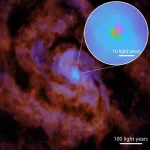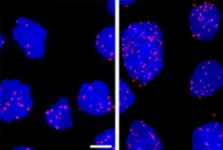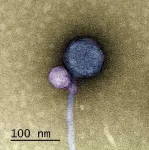Black holes are messy eaters
2023-11-02
(Press-News.org)
New observations down to light-year scale of the gas flows around a supermassive black hole have successfully detected dense gas inflows and shown that only a small portion (about 3 percent) of the gas flowing towards the black hole is eaten by the black hole. The remainder is ejected and recycled back into the host galaxy.
Not all of the matter which falls towards a black hole is absorbed, some of it is ejected as outflows. But the ratio of the matter that the black hole “eats,” and the amount “dropped” has been difficult to measure.
An international research team led by Takuma Izumi, an assistant professor at the National Astronomical Observatory of Japan, used the Atacama Large Millimeter/submillimeter Array (ALMA) to observe the supermassive black hole in the Circinus Galaxy, located 14 million light-years away in the direction of the constellation Circinus. This black hole is known to be actively feeding.
Thanks to ALMA’s high resolution, the team was the first in the world to measure the amount of inflow and outflow down to a scale of a few light-years around the black hole. By measuring the flows of gasses in different states (molecular, atomic, and plasma) the team was able to determine the overall efficiency of black hole feeding, and found that it was only about 3 precent. The team also confirmed that gravitational instability is driving the inflow. Analysis also showed that the bulk of the expelled outflows are not fast enough to escape the galaxy and be lost. They are recycled back into the circumnuclear regions around the black hole, and start to slowly fall towards the black hole again.
END
[Attachments] See images for this press release:


ELSE PRESS RELEASES FROM THIS DATE:
2023-11-02
A surprising mechanism that makes some cancers treatment-resistant has been discovered by Weill Cornell Medicine and NewYork-Presbyterian investigators. The mechanism, which involves the shuttling of messenger RNAs (mRNAs) from the nucleus to the cytoplasm, ultimately facilitates DNA repair in cancer cells. These cancer cells can thereby thwart treatments aimed at damaging their DNA.
In a project encompassing both fundamental research and clinical studies they demonstrated that a combination of approved chemotherapies, ...
2023-11-02
One in seven people in the US reported having had long Covid by the end of 2022, suggests a large-scale investigation of long Covid and symptom prevalence by academics at UCL and Dartmouth.
Having had long Covid is associated with anxiety and low mood, as well as an increased likelihood of continued physical mobility problems and challenges with memory, concentration or understanding, according to the findings published in PLOS ONE.
The risk of anxiety and low mood appeared to be lower for those who have been vaccinated, ...
2023-11-02
New York, NY (November 2nd, 2023) — The Mount Sinai Health System has received a $7 million grant from the Multiple Myeloma Research Foundation for a three-year project that aims to fast-track novel translational concepts to improve outcomes for people with high risk myeloma, the second most common blood cancer in the United States.
This grant award will facilitate a multidisciplinary research project that will analyze a large, diverse cohort of patient samples from all over the United States at the genomic and immune level and apply novel functional genomics technology to understand the critical events that drive ...
2023-11-02
November 2, 2023, Mountain View, CA -- The SETI Institute is delighted to announce that Dr. Pascal Lee will be honored with the 2023 Carl Sagan Prize for Science Popularization presented by Wonderfest. The prestigious Sagan Prize recognizes and encourages individuals who “have contributed wonderfully to the public understanding and appreciation of science.” Previous recipients from the SETI Institute include SETI Institute co-founder and SETI pioneer Jill Tarter, senior astronomer Seth Shostak and trustee Andrew Fraknoi.
“I am truly delighted and humbled by this award,” says Pascal Lee, “all the more because Carl Sagan was, and remains, ...
2023-11-02
No one had ever seen one virus latching onto another virus, until anomalous sequencing results sent a UMBC team down a rabbit hole leading to a first-of-its-kind discovery.
It’s known that some viruses, called satellites, depend not only on their host organism to complete their life cycle, but also on another virus, known as a “helper,” explains Ivan Erill, professor of biological sciences. The satellite virus needs the helper either to build its capsid, a protective shell that encloses the virus’s genetic material, or to help it replicate ...
2023-11-02
The gut microbiome, a community of trillions of microbes living in the human intestines, has an increasing reputation for affecting not only gut health but also the health of organs distant from the gut. For most microbes in the intestine, the details of how they can affect other organs remain unclear, but for gut resident bacteria L. reuteri the pieces of the puzzle are beginning to fall into place.
“L. reuteri is one of such bacteria that can affect more than one organ in the body,” said co-corresponding author Dr. Sara Di Rienzi, ...
2023-11-02
CAMBRIDGE, MA -- The human eye can perceive about 1 million colors, but languages have far fewer words to describe those colors. So-called basic color terms, single color words used frequently by speakers of a given language, are often employed to gauge how languages differ in their handling of color. Languages spoken in industrialized nations such as the United States, for example, tend to have about a dozen basic color terms, while languages spoken by more isolated populations often have fewer.
However, the way that a language ...
2023-11-02
A research team from the Universities of Cologne and Potsdam and the Max Planck Institute for Plant Breeding Research has found that the regional lines of the thale cress (Arabidopsis thaliana), a small ruderal plant which populates the streets of Cologne, vary greatly in typical life cycle characteristics, such as the regulation of flowering and germination. This allows them to adapt their reproduction to local environmental conditions such as temperature and human disturbances. The researchers from Collaborative Research Center / Transregio 341 “Plant Ecological Genetics” found that environmental ...
2023-11-02
Though beer is a popular drink worldwide, it’s usually made from barley, which leaves those with a gluten allergy or intolerance unable to enjoy the frothy beverage. Sorghum, a naturally gluten-free grain, could be an alternative, but complex preparation steps have hampered its widespread adoption by brewers. Now, researchers reporting the molecular basis behind sorghum brewing in ACS’ Journal of Proteome Research have uncovered an enzyme that could improve the future of sorghum-based beers.
Traditionally, beer brewers start with barley grains, which they malt, mash, ...
2023-11-02
ITHACA, N.Y. –Things may not have ended well for dinosaurs on Earth, but Cornell University astronomers say the “light fingerprint” of the conditions that enabled them to emerge here provide a crucial missing piece in our search for signs of life on planets orbiting alien stars.
Their analysis of the most recent 540 million years of Earth’s evolution, known as the Phanerozoic Eon, finds that telescopes could better detect potential chemical signatures of life in the atmosphere of an Earth-like exoplanet more closely resembling the age the dinosaurs inhabited than the ...
LAST 30 PRESS RELEASES:
[Press-News.org] Black holes are messy eaters





